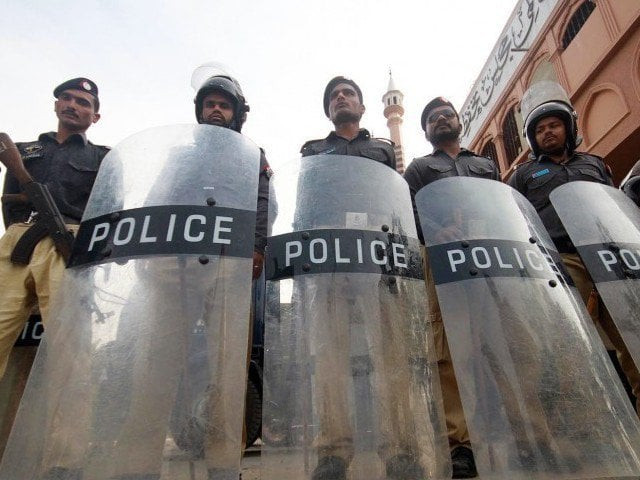Remembering the martyrs of K-P police
The true implementation of the National Action Plan is of paramount importance

KP Police
PHOTO: FILE
As far as bravery and sacrifices for lofty ideals go, K-P is second to none. The K-P Police — seeking inspiration from the culture and glorious history of the belt — have exhibited a sense of duty and devotion by giving the supreme sacrifice of their lives. However, as an institution, the police were faced with a new challenge in the form of terrorism and insurgency and have been a target for the last 18 years.
In order to gain social and physical space, terrorists used all kinds of tactics such as suicide bombings, IED blasts, targeted killings, kidnappings and attacks on police buildings. Such was the terror that it was difficult to speak a word against them. Peace was undermined and the writ of the state was constantly challenged with the emergence of ungoverned spaces. Death danced all around, particularly in Swat, Shabqadar and other parts of the province. It appeared that all had fallen, but the infallible hope of the police and the sacrifices of the martyrs made the impossible possible by restoring peace.
I have witnessed the crusade of the police in Swat, Bannu, Mardan, Shabqdar, Swabi and Peshawar as I led them in the rain of bullets, rockets and missiles and suicide squads. In Swat, every day and night was marked by death. Staying indoors or out was not without the danger of an attack. Slaughtering, maiming, killing, and bombing were a regular phenomenon. Remaining in the police or siding with them meant a death warrant. Knowing well that death awaited them, the police remained firm and many of them embraced martyrdom for the greater cause of peace.
When referring to extremist militancy, I do not speak as a theorist or as an investigative journalist. Like a surgeon, I have seen what, to many, may be hidden under the skin. Terrorism … yes I have seen it, touched it, felt it from very close quarters. Not only when I was called to participate in the operation to reclaim the scenic valley of Swat from the extremists, but also when my colleagues fell in the line of duty. I have felt the gasping breath of a terrorist suicide attack when I narrowly escaped but could not prevent my comrades in uniform from embracing martyrdom as they were waiting for me to exit my official residence. As I write today, thousands of police officials from Karachi to Khyber have lost lives to the attackers who wish to install something else instead of the state. They are forces who want to impose their way of life through the barrel of the gun.
Although the accounts of martyrs include all ranks from additional inspector general to the constables, I hold the constables in the highest regard. They had no ambition and motivation to become IGs but sacrificed their lives in the line of duty. These silent soldiers were the real strength that kept the institution intact in times of adversity. A total of 1,643 police officers and officials laid their lives to protect civilians from the brunt of militancy.
The leaders of the police also deserve appreciation for realising the gravity of the situation due to the high rate of casualties, and worked on getting the Shuhada’s package approved. While the package cannot compensate for the life lost, it can at least provide some sort of solace to the bereaved family and be a source of motivation for the institution. The package includes cash compensation ranging from Rs3 million to 10 million, continuation of payment of salary or pension of the deceased, cash payment in lieu of a plot of land and an education package ranging from Rs6,000 to 72,000 per annum. Besides this, in order to recognise the ultimate sacrifice of lives, important square, blocks and institutions have been marked with the names of the martyrs.
The institution of police, the government and the nation are proud of the martyrdom of our brave soldiers upon which the foundation of peace is built. The history of the province is truly written with the blood of these martyrs. However, while peeping into the history of militancy and terrorism in the country in general, and K-P in particular, the ominous question remains: Why has the land of peace been turned into the land of war? Why was a Pashtun and a Muslim slitting the throat of another Pashtun and a Muslim in the name of religion? Why have armed and violent non-state actors emerged creating an insurgency in the region? Who was responsible at the strategic level? The blood of the martyrs seeks these answers. These questions will be answered by history. While much is known about the reasons, a structured insight into the tragic happenings is still required. Sharing this information will also bring some solace to the families of the martyrs. The true implementation of the National Action Plan is of paramount importance, and driving out militants and eradicating the extremist mindset shall be the ultimate goal.
Published in The Express Tribune, August 14th, 2019.
Like Opinion & Editorial on Facebook, follow @ETOpEd on Twitter to receive all updates on all our daily pieces.















COMMENTS
Comments are moderated and generally will be posted if they are on-topic and not abusive.
For more information, please see our Comments FAQ